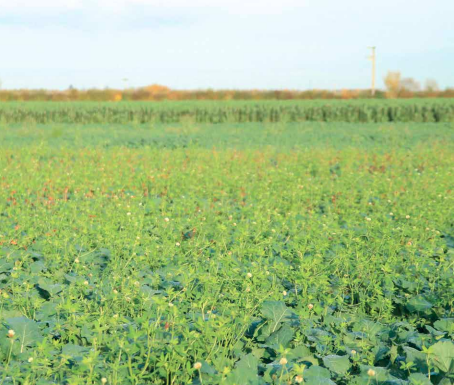By Dr Niki Rust, Research Associate, Centre for Rural Economy, Newcastle University – December 2018 issue
We all know that some parts of the UK are getting more and more water- and nutrient-stressed over time. With less predictable rainfall, extended periods of droughts or heavy rainfall, and declining nutrients in some soils, it is becoming increasingly difficult for farmers to grow crops in a similar manner to what they had done in the past. To keep up with this changing world, we are finding that we ourselves are having to change.
Historically, when crops have not had enough nutrients, we’ve turned to inputs like fertilisers. However, with increasing costs coupled with more restrictions on their use – and more regulations likely in the future – we’re having to innovate to find ways to improve nutrient-use efficiency of our crops. In terms of water, irrigation is one way to get around lack of water in the soils, but it is harder to deal with too much precipitation from rainfall. Some scientists have predicted that UK weather will become more unstable in the future, with more frequent outbursts of heavy rain followed by extended droughts. How we deal with these challenges whilst keeping farming profitable and productive still remains somewhat of a mystery.

Like farmers, the European Union is concerned about how to continue producing enough food for our population in these uncertain times. It has therefore provided funding for research into methods to improve water-use efficiency (WUE) and nutrient-use efficiency (NUE) for a number of staple European crops. SolACE is such a project, which stands for Solutions for improving Agroecosystem and Crop Efficiency for water and nutrient use. This cross-disciplinary and collaborative research involves natural and social scientists, crop breeders, farming organisations and other agricultural stakeholders from across Europe to develop and test methods that improve crop production in areas of water- and nutrient-stress.
The techniques we are testing include microbial inoculants, cover crops, genotype mixtures, hybrids, fertiliser additives, participatory breeding, decision support tools to improve WUE and NUE, and conservation agriculture based on minimum/no till. We are running controlled experiments at field stations in five countries alongside on-farm trials in seven countries to test how these techniques affect WUE and NUE in durum wheat, bread wheat and potatoes.
As part of the project, we want to learn from crop producers about what they think encourages or discourages uptake of practices that can improve their crop’s WUE and NUE, as well as what methods you currently use to deal with these issues. We are especially interested in hearing what you think will incentivise uptake, such as changes in policies, taxes, subsidies, regulations or education campaigns and knowledge transfer exchanges. We are running a short, 10-minute online survey to collect your views on this. The survey can be accessed here: https://goo.gl/ forms/NX5TkN7F1O5Csv1e2 or by using the QR code below. Please do feel free to share this survey widely with your farming contacts.
If you’d like more information on the project, you can access our website here: http://solace-eu.net and you can get more involved by joining our Stakeholder’s Forum https://www.solace-eu.net/getinvolved.html If you have any comments or questions on the survey, please feel free to contact me at niki.rust@ncl. ac.uk and I would be more than happy to hear from you.
